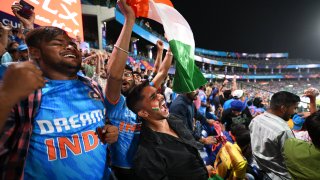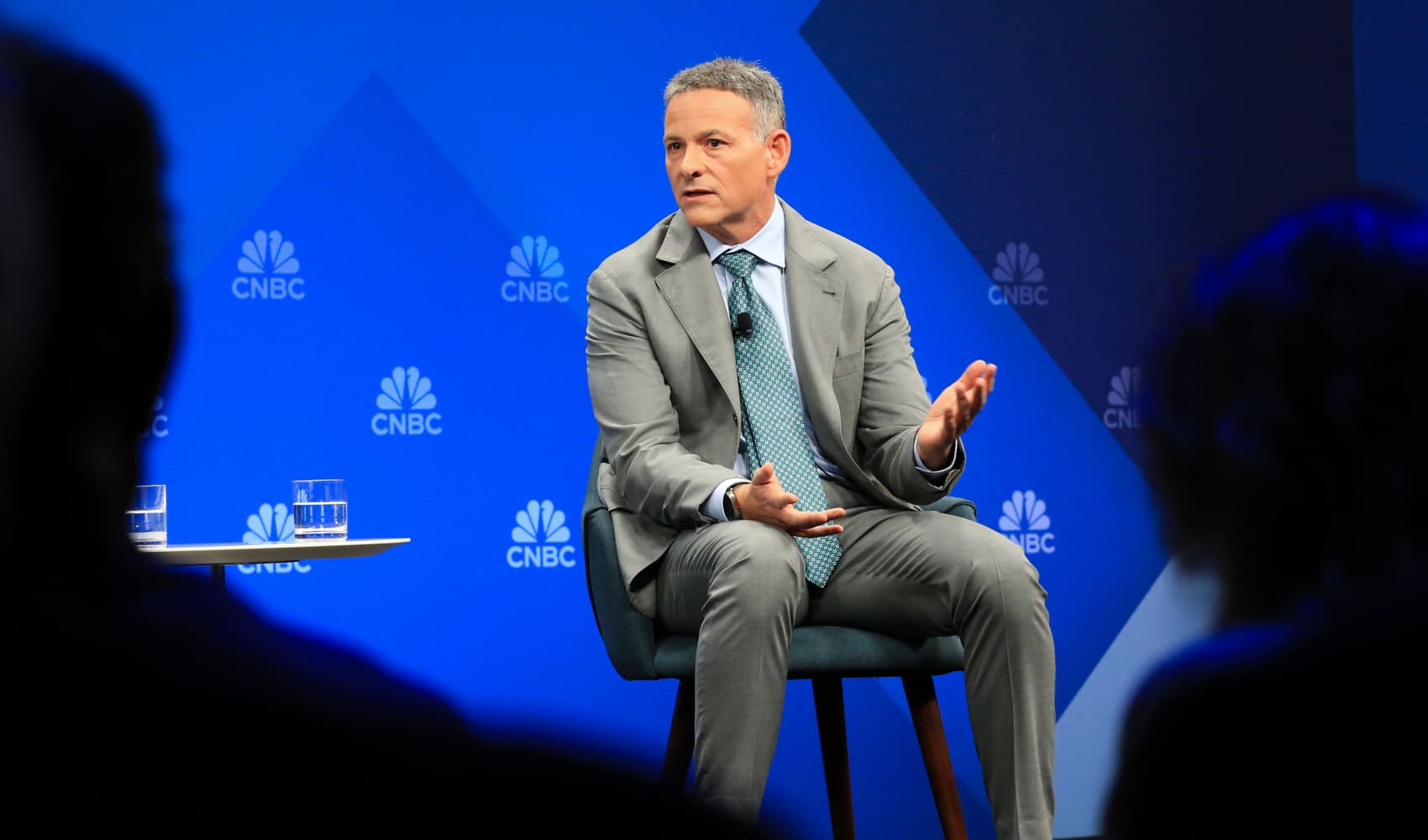
- India is once again hosting the Cricket World Cup after more than a decade. But unlike back in 2011, a global spotlight is now shining on the country and it is hosting all 48 matches for the first time.
- All five analysts that spoke to CNBC agree that travel, hospitality, food and beverage sales, and media advertising will continue to see a strong demand uptick.
India is once again hosting the Cricket World Cup after more than a decade.
Stream San Diego News for free, 24/7, wherever you are with NBC 7.
For the first time in cricket history, India will be hosting all 48 matches across 10 different cities — unlike in 2011 when it co-hosted the event with Bangladesh and Sri Lanka.
Cricket is the world's second most watched sport, behind only soccer.
Get top local San Diego stories delivered to you every morning with our News Headlines newsletter.
But in India, Bangladesh, Sri Lanka and Pakistan, it's the most popular sport which some have even called "a way of life."
The championship, which runs from Oct. 5 to Nov. 19, is set to boost consumer spending across various sectors, and could even help lift growth in the economy in the December quarter.
"It is difficult to estimate the impact the games will have, but the entire tournament will have a multiplier effect on the country's economy this quarter," said Shantanu Bhargava, managing director and head of listed investments at Waterfield Advisors.
Money Report
Hospitality, food and beverage, and media advertising are some sectors that will likely see strong demand uptick, all five analysts who spoke to CNBC said.
Travel
Demand for domestic and international flights to India surged months before the World Cup began, with die-hard fans snapping up air tickets even before securing seats for the match.
Flight searches to India surged between 110% to 130% in the months leading up to the World Cup, showed data from OTA Insight, a market intelligence platform.
According to travel analytics firm Cirium, there are 787 flights scheduled from Nov. 13 to 19 to Ahmedabad, where the final match will be held at.
The highly-anticipated match between India and Pakistan played out in Ahmedabad last weekend. A record number of 35 million fans tuned in to that match on Saturday, according to the International Cricket Council.
"Whilst it's hard for the data to reflect the reason the bookings were made, there seems to be a small correlation between the match schedules and number of flights scheduled," said Lalitya Dhavala, valuations consultant at Cirium.
Demand for international flights to India also surged by 15%, particularly prior to the games due to travelers from Australia, the U.K., New Zealand, Sri Lanka and the Netherlands, said Waterfield Advisors' Bhargava.
Dhavala highlighted that Indian budget air carrier IndiGo, which will operate more than half of all flights to Ahmedabad in the final week of the World Cup, is likely to raise prices.
Hotels
India's hospitality industry has experienced unprecedented growth after a strong Covid recovery, and demand continues to outpace supply.
Data from software firm RateGain showed that hotel rates in host cities increased by between 125% to 300% year-on-year in the October to November period.
Pune, where India will play against Bangladesh later this week, leads the price hikes with hotel prices surging by almost 360%. Hotels in Ahmedabad experienced a 310% rise, according to RateGain.
When India played against Pakistan last weekend, prices at Ginger, a hotel chain owned by Indian Hotels Company hit 50,000 rupees ($600). "In ordinary times, it will be one tenth the price and you can easily find a room for 4,000 rupees," Bhargava said.
Ticket holders who flew into Ahmedabad for the match even resorted to booking medical procedures in the city's hospitals so they had somewhere to stay if they could not secure a hotel room, Bhargava said.
"All categories of accommodations from business hotels to Airbnbs were sold out … It's absolute craziness."
Food and beverages
Food delivery services, restaurants and mom-and-pop stores will also benefit from the games.
"There is an expectation that food delivery companies will see a boost in this quarter," said Aditya Suresh, head of equity research for India at Macquarie Group.
Suresh said food delivery firm Zomato saw an increase in transacting users and transaction frequency, and shares have surged by 88% since the beginning of the year, data from LSEG showed.
Alcohol is prohibited from stadiums, but fans catching the match at home or at a restaurant will likely do so with a pint in hand.

"It's very hard to put a number on how much the sector will grow, but since it's an occasion where people will get together, we do see an uptick in alcohol sales," said Avi Mehta, senior research analyst at Macquarie Group.
"The celebrations will grow larger as India progresses further into the finals and more people will host parties," Mehta said. "Consumption of alcoholic beverages will also increase in restaurants, but that will be restricted to restaurants that screen the matches."
Shares of United Spirits, which owns Kingfisher — India's largest selling beer — has gained 23% since the start of the year.
Similarly, Radico Khaitan, has gained 24% since the beginning of 2023.
"We do expect to see a boost in quick commerce specifically on weekends where there are India matches," said Shibani Kurian, senior executive vice president and head of equity research at Kotak Mahindra AMC.
"We must remember that the World Cup coincides with the Diwali season. So the boost in consumption during this period will be seen in the December quarter."
Diwali is widely celebrated in India. The religious festival typically boosts consumption in food and beverage, textile, electronics and gold.
Media and advertising
During the last Cricket World Cup in 2019, a global average of 1.6 billion people tuned in. It's no surprise then that well-known brands like Coca-Cola and Booking.com are this year's event sponsors.
According to Bhargava, Disney+ Hotstar, the digital broadcaster of all 48 matches, will amass sponsorship and advertising revenues of $300 million. India's ICC is expected to garner close to half a billion dollars from this, and 30% of that amount will be given to the Board of Control for Cricket in India (BCCI).

Despite the resounding success in viewership, the BCCI has been under a lot of flak for not managing ticket sales well.
From delayed sales to website glitches — and empty stands at stadiums despite tickets being told they were sold out — many fans have blamed India's cricket board as well as the International Cricket Council for low attendance during the first few matches.
Some angry fans took to social media to express their rage about not securing seats to the matches, saying that the organization is "a mess" and has "deflated the most exciting cricket event."
"Organizers in India seem to have dropped the ball on ticket sales. As a cricket fan, it was very tough for me to digest that. There were a lot of empty seats during the opening game between England and New Zealand, and that continued even during some of the India games," Bhargava said.
"A lot of economic activity is linked to people moving around and watching the match in stadiums ... But the multiplier impact of this tournament could get dampened a bit because the ticket sales have seemingly not been managed efficiently."






